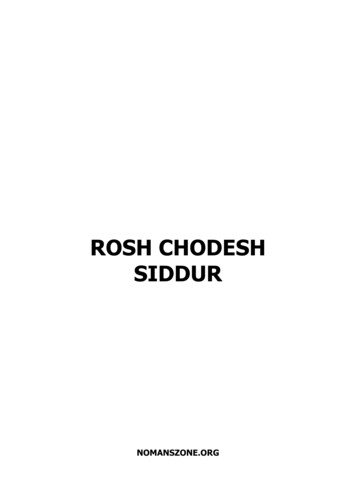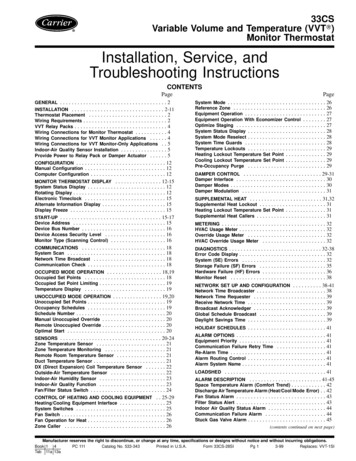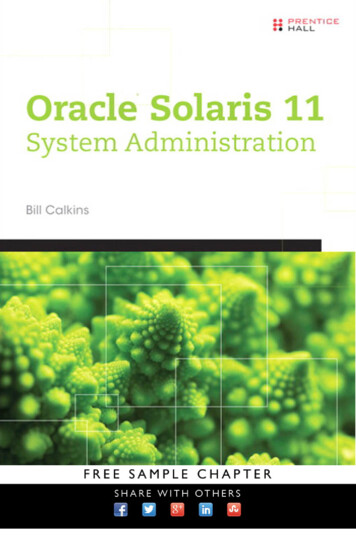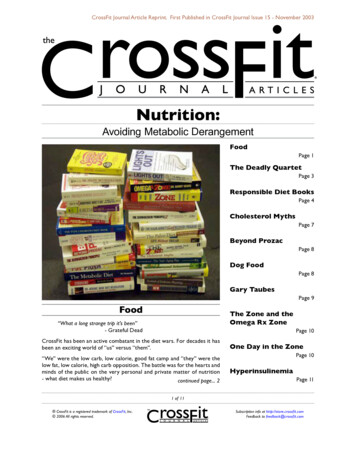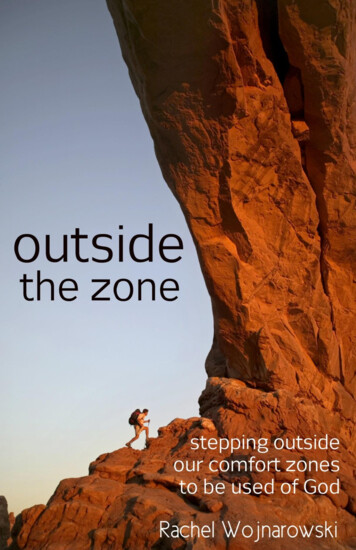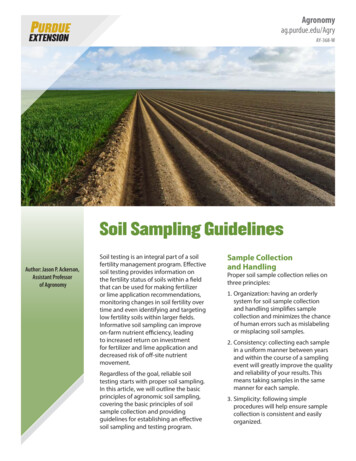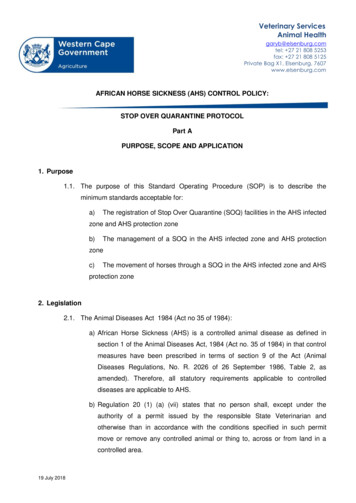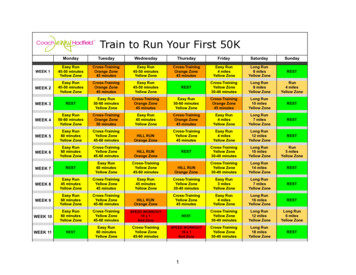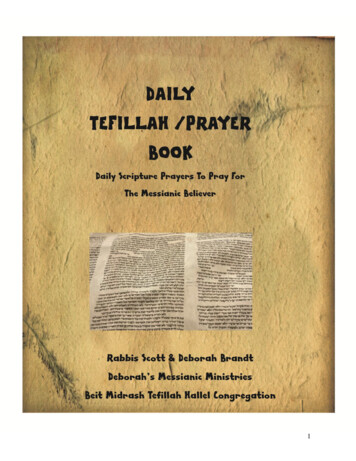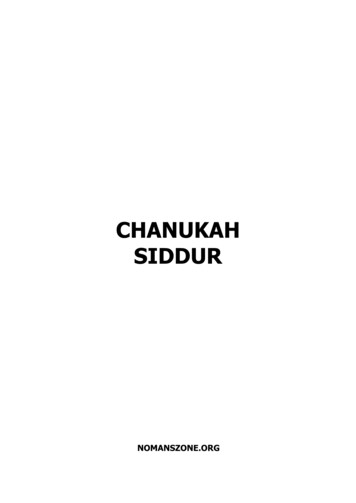
Transcription
CHANUKAHSIDDURNOMANSZONE.ORG
NOMANSZONE.ORGCHANUKAHTHE FEAST OF DEDICATIONIn many parts of the world, Chanukah is a relatively unknown feast or holiday. However, this is not thecase in America and many parts of Europe. This is a well-known feast or holiday celebrated by millionsof people, including non-Jews and some Churches.Because Chanukah is celebrated in the same month as Christmas (December), which corresponds to theHebrew month of Kislev, there is some confusion over the difference between these two days. This isfurther confused by the fact that gifts are exchanged on these days, and lights are the center attractionof both of these festivals. It is sometimes called the Feast of Lights.Chanukah means dedication, consecration, or inauguration. It is an eight-day festival thatcommemorates Judah’s victory over the Syrian tyrant Antiochus which usually starts around earlyDecember. To understand the origins of Chanukah, we need to do a little history lesson on the periodjust before the birth of our Messiah Yeshua. We also need to be mindful that this period of history isclearly prophesized and meticulously recorded in Daniel Chapter Eleven, additional confirmation ofwhy Chanukah should be celebrated.Alexander the Great had conquered Yisra’el and most of the Near East. When he died in 323 BCE, hisempire was divided among his four generals, two of whom established their own sovereign kingdomsin Egypt and Syria. Yisra’el being located between these two countries was valuable to both. As a result,Yisra’el became a battlefield, sometimes ruled by one and sometimes by the other for 150 years.In 175 BCE, when Yisra’el was under Syrian control, Antiochus Epiphanes IV became King of Syria.In an effort to strengthen his hold on Yisra’el, he declared that all his subjects must worship the sameGreek gods and follow the same Greek customs and speak Greek. Altars to the Greek gods were builtin all the cities of Judea, and pagan sacrifices were offered on them.Yisra’el were not permitted under the Greek law to study Torah, observe the Shabbat, practicecircumcision, speak Hebrew, or do anything Hebrew as this was punishable by death. It was the forcedconversion of the Yisraelite people to Greek culture (called Hellenization), and many Hebrews wereassimilated into the Greek culture. However, there were many who opposed Hellenization because theyfeared that the influence of Greek culture would destroy Yisra’el. This movement was called Hasidim.This movement grew in strength when on the 25th of Kislev, Antiochus placed a statue of Zeus abovethe high Altar of sacrifice in the Temple and sacrificed a pig on it. He then made it compulsory forPriests to offer pigs on the Altar.The Hasidim began their opposition with a simple refusal to obey the laws of Antiochus. As a result,they suffered harshly, and many were killed. They had no choice but to rebel. Beginning in a small townof Modiin, not far from Yerushalem, a Hasmonean priest named Mattathias and his five sons launcheda revolt. This revolt developed into a guerrilla war led by one of Mattathia's sons Judah Maccabee.Maccabee means hammer and became the name by which this period is known in history. Two booksin the Catholic Bible called Maccabees One and Two record the history of this period.Judah Maccabees led a small army of Hebrews in the guerrilla campaign for several years in thesurrounding hills and defeated the mighty Syrian Greek army recapturing Jerusalem. It was indeed amiraculous victory! Maccabees cleansed the Temple and removed the statutes of Zeus, and on the 25 thday of the month of Kislev (which is in December around the time of the winter solstice, the darkestday of the year) in the year 165 BCE, they rededicated the Temple.1
NOMANSZONE.ORGWhen Maccabees gained control of the Temple, they found only one undefiled cruse of oil with whichthey could light the temple menorah. According to the tradition, a one-day supply of oil lasted a fulleight days, thus keeping the menorah lit while allowing them time to consecrate more oil (Shemoth(Exodus) 31:11). Consequently, this is also called the festival of lights or dedication. This specialoccasion is now celebrated with a specially created eight, or nine-branched candelabra called ahanukkiah (plural Hanukkiot). These lamps are lit by the ninth light called the Shammas, which meanshelper servant. These lamps are lit consecutively, one per day, until the last night of the eighth day whenall eight have been lit together with the Shammas.According to the Jewish Encyclopedia - in Israel today, “Chanukah has become a symbol of nationalliberation and the triumphant Jewish spirit.”This feast is not a Shabbat day; therefore, work is permitted during the week of Chanukah.You will need the following for this ceremony. A white table cloth.Nine small to medium-sized candles or lamps.A vase of fresh flowers.Set these items out over the table on a white table cloth. Place the candles or lights in a row of nineacross the white cloth. Place the vase of flowers in a safe spot on the table. You are now ready!Note: Many celebrants of this holiday display a decorative nine-branched menorah inside or outsidetheir home. Many also install festive lights and decorations.2
NOMANSZONE.ORGFIRST NIGHT ONLYOne each night light one candle or lamp until all nine are lite on the last day.All present read or sing:Barukh Atah, , Eloheinu Melekh ha’Olam, Shehecheyanu v’kiyemanu v’higianu laz’man hazeh.Praised are You, YHWH, our Elohim King of the Universe, Who has kept us in life, and sustained us,and enabled us to reach this festive season.The Father or Leader reads:Following the lighting of the candle or light, a longer section of the text, called Hanerot Hallalu (“theseLights”), is recited.We kindle these lights Hanerot Hallalu to remember the wonders, the salvations, and the battles whichyou performed for our ancestors in the former days at this season through your Kohen (set-apart Priests).During these eight days, these lights are set-apart. We are not permitted to use them for mundanepurposes, only to gaze at them intently as a way of thanking you for your unending miracles, wanders,and salvations.At this season, we remember that the set-apart Temple and its Alter was rededicated to you. Similarly,we (re)dedicate our home and prayer alter to you and may it be that when you listen to the supplicationsof your eved (servant), when we shall make tefillah (praise) on our alter: and listen in the shamayimyour dwelling place and when you hear us grant us speedily your miracles, wanders and deliverance asdid for our ancestors in the former days at this season.An additional prayer may be added here to acknowledge the light of salvation that was given at thistime.We also remember that at this time, the light of our salvation was conceived by Ruach haKodesh, yourSon Yeshua haMoshiach, and for this gift, we are eternally grateful.“For unto us a Child is born, to us a Son is given: and the government shall be upon His shoulder: andHis Name shall be called Wonderful, Counselor, The Mighty-El, The Everlasting Abba, The SarShalom” Yeshayahu (Isaiah) 9:6.Hosanna in the Highest Shamayim!3
NOMANSZONE.ORGON EACH NIGHTOne each night, light one candle or lamp until all nine are lit on the last day.All present read or sing:Barukh Atah , Eloheinu Melekh ha’Olam, Asher kid’shanu b’mitzvotav v’tzivanu l’hadlik ner shelChanukah.Praised are You YHWH, our Elohim King of the Universe, Who made us set-apart by Mitzvot(commandments) and instructed us to light the Chanukah candles.Barukh Atah , Eloheinu Melekh ha’Olam, She’asah nissim la’avoteinu bayamim hahein bazmanhazeh.Praised are You, YHWH, our Elohim King of the Universe, Who performed miracles for our ancestorsat this season in ancient days.The Father or Leader reads:We kindle these lights Hanerot Hallalu to remember the wonders, the salvations, and the battles whichyou performed for our ancestors in the former days at this season through your Kohen (set-apart Priests).During these eight days, these lights are set-apart. We are not permitted to use them for mundanepurposes, only to gaze at them intently as a way of thanking you for your unending miracles, wanders,and salvations.Many people, particularly Sephardic Jews (those descended from Spanish Jews), recite Psalm 30following the lighting of the candles.All present read:TEHILLIM (PSALM) 301 I will extol You, O ; for You have lifted me up, and have not made my foes to gilah (rejoice) overme. 2 O my Elohim, I cried to You, and You have healed me. 3 O , You have brought up mybeing from Sheol: You have kept me alive, that I should not go down to the pit. 4 Sing to , O youkidushim (saints) of His, and give hodu (thanks) at the remembrance of His set-apartness. 5 For Hisanger endures but for a moment; in His favor is chayim: weeping may endure for a night, but simcha(joy) comes in the morning. 6 And in my ease I said, I shall never be moved. 7 , by Your favor Youhave made my har (mountain) to stand strong: You did hide Your face, and I was troubled. 8 I cried toYou, O ; and to I made my plea. 9 What profit is there in my dahm (blood), when I go down tothe pit? Shall the dust hallel (praise) You? Shall it declare Your emet (truth)? 10 Hear, O , and haveRachamim (mercy) upon me: , be my helper. 11 You have turned my mourning into dancing: Youhave put off my sackcloth, and clothed me with simcha (joy); 12 So I will shir halleluyah (sing praises)to You, and not be silent. my Elohim, I will give hodu (thanks) to You le-olam-va-ed (forever).4
NOMANSZONE.ORGCHAG TOVThe traditional well wishes for the festival seasonAll present say to one another:Chag same’yakh!Have a good holiday, a holiday of peace and success.The meal is served.BAREICHThe blessing after the mealAll present read:Barukh Harachman Mazon ha’acilah Hazot.Praised be the Merciful One, Provider of this food.Harachaman, Hu yishlach b’rakha m’ruba babayit hazeh v’al shulkhan zeh she’achalnu alav. Amein.May the Merciful One send abundant blessing upon this dwelling and the table at which we have eaten.Amein.All Scripture reference is from the RSTNE versionwww.nomanszone.orgCopyright NOMANSZONE5
NOMANSZONE.ORG 3 FIRST NIGHT ONLY One each night light one candle or lamp until all nine are lite on the last day. All present read or sing: Barukh Atah, , Eloheinu Melekh ha'Olam, Shehecheyanu v'kiyemanu v'higianu laz'man hazeh. Praised are You, YHWH, our Elohim King of the Universe, Who has kept us in life, and sustained us,

